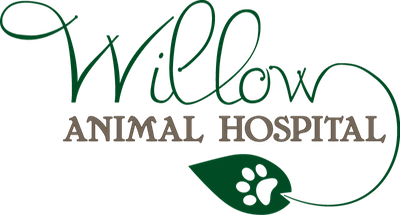Author Archives: WAH
Allergies?
Do you think your pet has a food allergy? Food allergies can cause both allergic skin disease and gastro-intestinal problems. Symptoms of allergic skin disease include scratching or licking the skin which can result in poor coat quality, hair loss and skin infections. Gastrointestinal symptoms of food allergies in-clude vomiting and diarrhea. Diagnosis of a food allergy involves consultation with your veterinarian and a food allergy elimination diet trial. Dr. Sarah Myers, Willow Animal Hospital
(photo courtesy of: expertbeacon.com)
Why are all calico & tortoiseshell cats female?
Have you ever noticed that all tortoiseshell and calico cats are female? There is a reason!
The trait for hair coat color is linked to the trait that determines gender in cats. Gender is determined by certain chromosome combinations. The XX chromosome combination results in a female. The XY chromosome combination results in a male. The X chromosome can be linked to either the color black or orange in cats. Therefore female cats can potentially be both black and orange (because they have two X’s) whereas males can only be black or orange (because they have only one X chromosome). The one rare exception is if a cat is born with the genetic mutation of being XXY. This rare condition, called Klinefelter Syndrome, is the only possible way to get a male calico cat! Dr. Sarah Myers, Willow Animal Hospital
(photo courtesy of: ionetics.blogspot.com)
What is Lepto anyway?
Leptospirosis is a potentially fatal bacterial disease that can cause a very sudden onset of kidney and liver failure in dogs. It is transmitted through urine from infected mammals – often wildlife. Dogs that are at highest risk are those that drink water sources that could be contaminated with wildlife urine. Prevention of this disease is possible with a two shot initial series followed up by an annual vaccine. Leptospirosis is a zoonotic disease, meaning it can be spread from animals to people. Therefore, keeping your pets safe from the disease will help to prevent transmission to your family too. Dr. Sarah Myers, Willow Animal Hospital
(photo courtesy of: www.playbuzz.com)
Independence Day Tips
Happy 4th of July! As you enjoy the festivities remember to keep your pets’ safety in mind. The stressful noises of parades and fireworks can be a major source of stress for your pets. Make sure they are secured in a safe place or on a secure leash during parades and fireworks. The loud noises from the festivities can often scare pets enough that they run away and become lost. If your pets’ stress is severe schedule an appointment with your veterinarian to discuss medication options that may help to calm them. Dr. Sarah Myers, Willow Animal Hospital
(photo courtesy of: www.seesamsit.com)
Eh? What's that? Speak up!
Ear infections are one of the most common infections seen at a vet clinic. Clues that your pet might have an ear infection include head shaking and ear scratching with increased frequency. Sometimes just a bad odor or lots of debris in the ear is the main symptom. Ear infections can become severe the longer they are present causing hearing loss or head tilts from inner/middle ear infections. Prompt treatment is important so contact your veterinarian if you are concerned about an ear infection right away! Dr. Sarah Myers, Willow Animal Hospital
(photo courtesy of: prospectparkanimalclinic.com)
Kids & Pets
Did you know that pets can transmit some infections to people? These types of transmissible conditions are called zoonotic diseases. With good preventive care risk is extremely low. Intestinal parasites are one of the most common zoonotic diseases we see in pets. We recommend monthly preventive deworming products to prevent your pets from getting intestinal parasites. Preventing your pets from getting these infections is the first line of defense in preventing transmission to your family. Schedule your pet’s annual exam to learn more about which product is best for your pet! Dr. Sarah Myers, Willow Animal Hospital
(photo courtesy of: topicnow.info)
Happy Easter!
Happy Easter! Remember that the tasty chocolate treats we love so much on this holiday can be toxic to your pets. In general, avoid feeding any chocolate to your pet but if they do get into it—how much is too much? Here is a tip to live by: the darker and more bitter the chocolate, the more toxicity risk. With milk chocolate more than 0.5 ounces per pound and with dark chocolate more than 0.1 ounces per pound can result in toxicity. Mild signs of toxicity include vomiting and diarrhea while more severe signs include heart arrhythmias, tremors, seizures even collapse. Contact your veterinarian if you are concerned about chocolate ingestion with your pet! Dr. Sarah Myers, Willow Animal Hospital
(photo courtesy of: askthepodcastcoach.com)
Attack of the ticks!
Tick season is coming!! Are you ready?? There are several common tick transmitted diseases in northern Wisconsin including Lyme, Anaplasmosis and Ehrlichiosis. These diseases can cause serious illness and even be deadly to our four legged friends. Using monthly tick prevention products like Vectra 3-D or Frontline along with daily tick checks are the best way to prevent transmission of these diseases in our pets. It can take several months after transmission before symptoms develop. Once symptoms do develop they often come on very quickly (less than 24 hours). If your pet displays lethargy, limping, or lack of appetite contact your veterinarian as these are common signs of tick transmitted diseases. Early treatment can help to prevent fatal complications so don’t delay in calling your veterinarian! Dr. Sarah Myers, Willow Animal Hospital (photo courtesy of: http://becuo.com)













